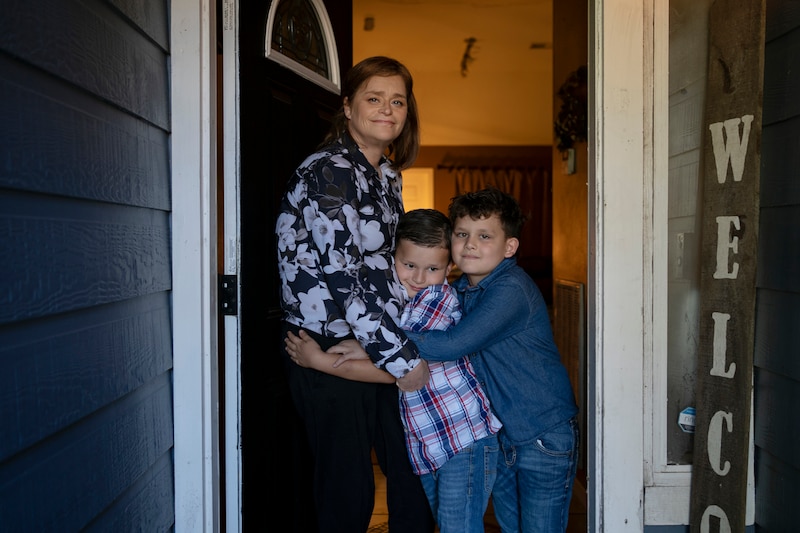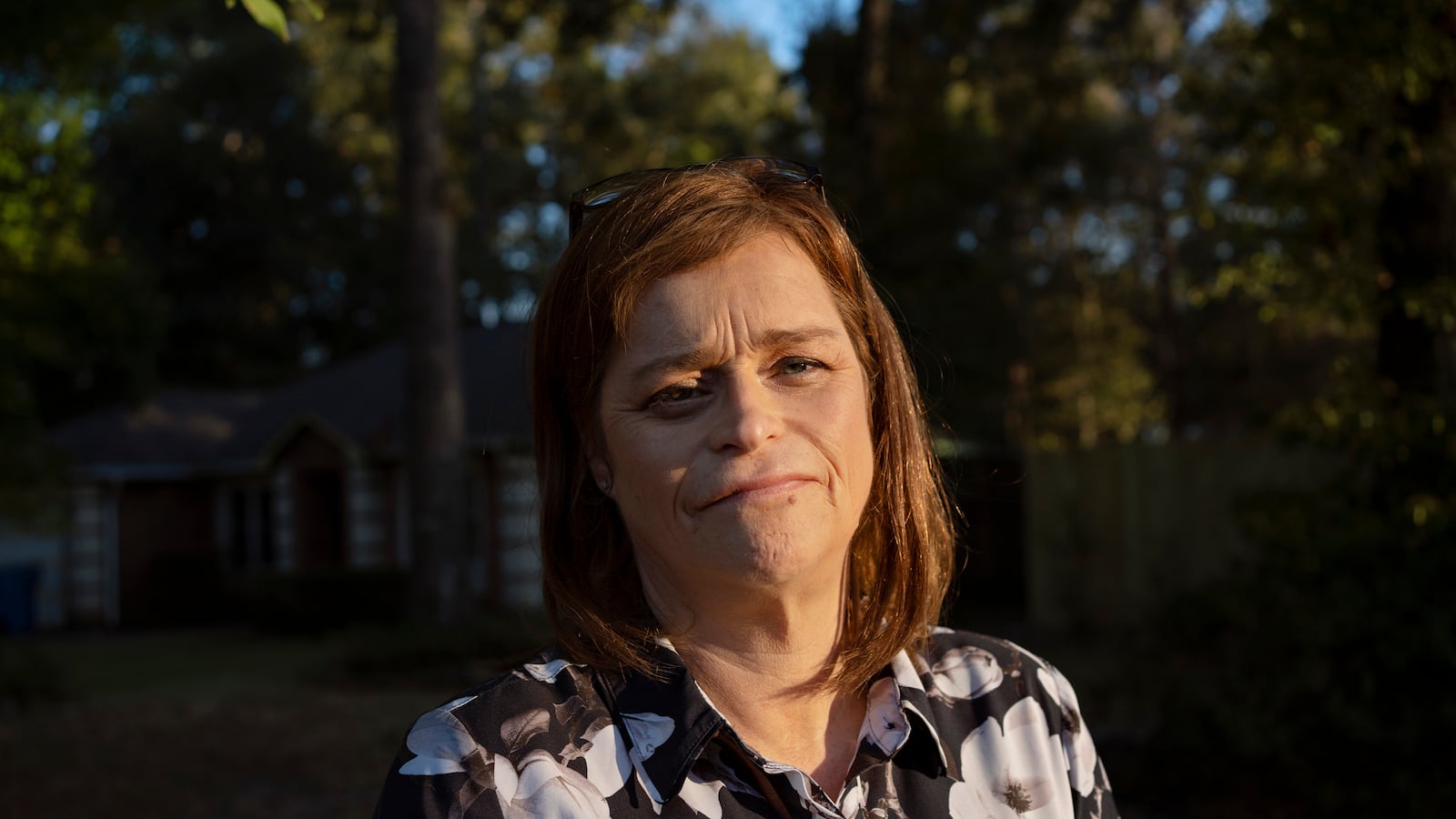Votebeat is a nonprofit news organization reporting on voting access and election administration across the U.S. Sign up for Votebeat Texas’ free newsletter here.
This article is co-published with ProPublica, a nonprofit newsroom that investigates abuses of power, and with The Texas Tribune, a nonprofit and nonpartisan newsroom that engages with Texans. Sign up to receive ProPublica’s biggest stories here and The Texas Tribune’s newsletters here.
Mary Howard-Elley fervently believes illegal immigration in the U.S. is a critical problem that only former President Donald Trump can solve. She says the continuation of his border wall and promised mass deportations will make the country safer.
She agrees with Trump’s unfounded claims that Democrats are opening the borders to allow noncitizens to vote, fearing that it could ultimately cost him the election.
Howard-Elley didn’t pay much attention when Texas Gov. Greg Abbott helped fuel that narrative by announcing that the state had removed thousands of supposed noncitizens from its rolls, claiming some had a history of voting.
Then the U.S. citizen learned she was among them.
The elections office in Montgomery County, just north of Houston, had sent Howard-Elley a letter in late January saying that she had been flagged after she indicated that she was not a U.S. citizen in response to a jury summons. She had 30 days to provide the county proof of citizenship or she would be removed from the voter rolls, according to the letter.
The retired Transportation Security Administration agent was confused by how the county could come to that conclusion. And she seethed at the idea that anyone would question the citizenship of a former federal employee with the “whitest name you could have.”
“Who is allowing people to do this to United States citizens? I understand we have a problem with immigration, but come on now,” Howard-Elley said in an interview.
The 52-year-old disputes the county’s claim that she responded to the jury duty summons by saying she was not a citizen. Instead, Howard-Elley said, she called and asked to be exempted from jury duty because of guardianship duties for three of her grandchildren.
The Montgomery County district clerk’s office, which organizes jury duty, did not respond to repeated questions and denied a public records request for Howard-Elley’s response to the jury summons, asserting it was exempt from disclosure.
Regardless of how she was flagged as a noncitizen, Howard-Elley wanted to ensure she could vote. She ordered several copies of her certified Louisiana birth certificate and confirmed receipt with an elections office employee. She thought the matter was resolved.
But Howard-Elley’s registration was not reinstated, making her the 10th U.S. citizen identified by ProPublica, The Texas Tribune, and Votebeat who was removed from the rolls as a potential noncitizen. The news organizations tracked them down as part of an investigation that found Abbott’s claims about the state removing more than 6,500 noncitizens were likely inflated and, in some cases, wrong.
The 10 U.S. citizens who were struck from the rolls represented a range of racial and political backgrounds, and most were removed as the result of human error.
Abbott’s press release provided fodder for Republicans warning that noncitizens could vote in large numbers and sway the election, though experts say such instances are exceedingly rare.
Texas Attorney General Ken Paxton sued the federal government last week, claiming the Department of Homeland Security has refused to help the state check the citizenship status of some registered voters. The federal agency offers states access to a database that can be used to verify immigration status, but Paxton argued it’s inadequate and requires a fee for each verification. Ten other states use the database for voting-related purposes.
Neither Abbott nor Paxton responded to questions for this story. DHS has not filed a response to the attorney general’s lawsuit in federal court.

Howard-Elley’s case shows how eligible voters can be removed from the rolls — and how tough it can be to get back on.
She didn’t realize her registration was canceled until reporters called her this month. Darla Brooks, the Montgomery County voter registration manager, told both Howard-Elley and the news organizations that she had not been reinstated in March because her birth certificate arrived after the 30-day window she was given to prove her citizenship.
On Oct. 14, Brooks said Howard-Elley had now also missed the registration deadline for this year’s election and would not be able to vote.
The election official was wrong.
Multiple voting rights lawyers pointed to a state law that says counties should immediately reinstate voters’ registrations that were wrongly canceled. Brooks initially told reporters that the law did not apply to Howard-Elley because the county had followed proper procedures when removing her.
But when the news organizations brought the same question to the Secretary of State’s office, which provides counties with guidance on implementing election laws, the answer was different.
A 2021 agency advisory instructs counties to immediately reinstate voters removed for failing to respond to a notice as soon as they present proof of citizenship. They can even be reinstated at a polling place on Election Day.
Less than two hours after the news organizations sent the Secretary of State’s advisory to Montgomery County, Howard-Elley was back on the rolls.
“I’m sorry that Montgomery County has to be shown the law to abide by it,” Howard-Elley said. She added that this election would have been the first time in more than 30 years she failed to cast a ballot for president. “I just hope they don’t do this to anybody else ever again, because it’s not fair.”
Montgomery County Elections Administrator Suzie Harvey said her office had never had to deal with a situation like Howard-Elley’s, and while she likely saw the advisory when it was issued, she had forgotten about the specific guidance. She said her office worked quickly to reinstate Howard-Elley when the news organizations flagged the advisory, and she is gratified that Howard-Elley will be able to vote.
“That would have been extremely tragic,” Harvey said.
Not every voter has Howard-Elley’s tenacity, or news organizations asking persistent questions about how their case was handled.
“Voting should not be so hard that you have to be a lawyer or have lawyer skills to be able to vote,” said Nina Perales, vice president of litigation at the Mexican American Legal Defense and Educational Fund.
Perales said it would take “heroic efforts” by the average voter to research the election laws and advocate for their registration to be reinstated.
Even then, the decision would depend on how election officials in their county interpret laws and guidance.
Three county election officials gave different answers to the question of whether they would reinstate a voter in Howard-Elley’s situation, though all stressed they would try their best to follow the law.
One said the voter should be reinstated. The other two said they would likely reinstate the voter after the registration deadline only if the county had erred in some way.
Those differences give “voters in some counties fewer rights than voters in other counties,” said Emily Eby French, the policy director at Common Cause Texas, a nonprofit that advocates for voting access.
Howard-Elley said she is disturbed at how close she came to losing her ability to vote. If reporters hadn’t called her, Howard-Elley said, she might have been turned away at the polls.
She said she worries about whether other eligible voters are among those labeled as noncitizens and that Abbott should look into whether there are more U.S. citizens among them. The lifelong Republican said state and county officials need to be held accountable to ensure more U.S. citizens are not erroneously removed.
“The system is very flawed,” Howard-Elley said. “I feel really sad that we’re in a situation like this. You would think in 2024 we wouldn’t have issues like this.”
She intends to cast her ballot for Trump.
How to dispute your removal
If your voter registration is canceled because you failed to respond to a letter trying to confirm your citizenship, here’s what you can do:
- Contact your county elections office before heading to the polls. Show proof of your citizenship and ask to be reinstated.
- You can also share this 2021 advisory from the Texas Secretary of State’s office on reinstating citizens to the voter rolls.
- Common forms of documentation include a U.S. passport or certified birth certificate. See the full list of acceptable proof of citizenship in the advisory.
- If you don’t find out until you arrive at the polls that you need to show proof of citizenship, that advisory still requires election officials to reinstate you immediately after you do so.
- Contact the Texas Secretary of State’s office for additional assistance.
Natalia Contreras is a reporter for Votebeat in partnership with the Texas Tribune. Contact Natalia at ncontreras@votebeat.org.
Lexi Churchill and Vianna Davila are reporters for ProPublica and the Texas Tribune. Contact them at lexi.churchill@propublica.org and vianna.davila@propublica.org.
James Barragán is a politics reporter for The Texas Tribune. Contact him at james.barragan@texastribune.org.

